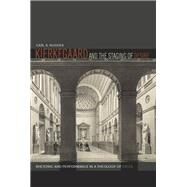Kierkegaard and the Staging of Desire Rhetoric and Performance in a Theology of Eros
, by Hughes, Carl S.- ISBN: 9780823257256 | 0823257258
- Cover: Hardcover
- Copyright: 7/2/2014
Theology in the modern era often assumes that the consummate form of theological discourse is objective prose--ignoring or condemning apophatic traditions and the spiritual eros that drives them. For too long, S°ren Kierkegaard has been read along these lines as a progenitor of twentieth-century neo-orthodoxy and a stern critic of the erotic in all its forms. In contrast, Carl S. Hughes argues that Kierkegaard envisions faith fundamentally as a form of infinite, insatiable eros. This book depicts the essential purpose of Kierkegaard's writing as to elicit ever greater spiritual desire, not to provide the satisfactions of doctrine or knowledge.
Kierkegaard and the Staging of Desire is both a rich historical analysis of the aesthetic and intellectual context of Kierkegaard's rhetoric and an argument for its enduring value as a model of what theological writing can be. Hughes situates Kierkegaard against the backdrop of Romantic aesthetics, Kierkegaard's Danish cultural world, and the Lutheran theological tradition that Kierkegaard by turns appropriates, radicalizes, and critiques. Hughes also connects Kierkegaard's approach to desire and communication to that of recent postmodern voices such as Jacques Derrida and Emmanuel Levinas.
The book's argument revolves around close readings of provocative, disparate, and (in many cases) little-known Kierkegaardian texts. The thread connecting all of these texts is that they each conjure some sort of performative stage setting, which they invite readers to enter. These Kierkegaardian "stagings" range from playful celebrations of vaudeville and farce theater to earnest meditations on the Eucharist in Copenhagen's most important church. By analyzing the theological function of these texts, Hughes sheds new light on the role of the aesthetic in Kierkegaard's authorship, his surprising affinity for liturgy and sacrament, and his overarching effort to conjoin eros for God with this-worldly love.
Kierkegaard and the Staging of Desire is both a rich historical analysis of the aesthetic and intellectual context of Kierkegaard's rhetoric and an argument for its enduring value as a model of what theological writing can be. Hughes situates Kierkegaard against the backdrop of Romantic aesthetics, Kierkegaard's Danish cultural world, and the Lutheran theological tradition that Kierkegaard by turns appropriates, radicalizes, and critiques. Hughes also connects Kierkegaard's approach to desire and communication to that of recent postmodern voices such as Jacques Derrida and Emmanuel Levinas.
The book's argument revolves around close readings of provocative, disparate, and (in many cases) little-known Kierkegaardian texts. The thread connecting all of these texts is that they each conjure some sort of performative stage setting, which they invite readers to enter. These Kierkegaardian "stagings" range from playful celebrations of vaudeville and farce theater to earnest meditations on the Eucharist in Copenhagen's most important church. By analyzing the theological function of these texts, Hughes sheds new light on the role of the aesthetic in Kierkegaard's authorship, his surprising affinity for liturgy and sacrament, and his overarching effort to conjoin eros for God with this-worldly love.







